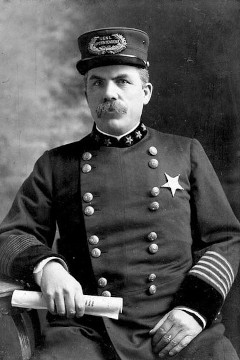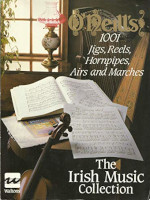Renowned and respected banjo man Dan Walsh finally gets to release the album that he always dreamed of recording: O’Neill’s Tunes.
When looking back to when you were a teenager a smile often comes to the face thinking about what you dreamed of achieving. Maybe a footballer scoring the winning goal in a final at Wembley, or the inventor of a product that changed the world. Dan Walsh had a dream from the moment that he first took up the Banjo to record an album of his favourite Irish tunes, and now after numerous award nominations, collaborations, albums, and world tours it has finally happened.
Much sought after Banjo man Dan took to the instrument at an early age and growing up in Staffordhshire his parents inadvertently found the ideal tutor for him in the form of the legendary George Davies. At this point in life Dan’s heroes were tenor banjo players Barney Mckenna and Gerry O’Connor but lessons with George led to Dan learning, via the work of Ken Perlman as well, how to combine the grace and melody of playing Tenor with the percussive rhythmic style of clawhammer banjo to create a unique approach to the instrument.
His love of music took him to Newcastle to study a degree in Folk music, leading to Dan becoming an in demand musician solo, in duos, as part of collaborations, and in the Urban Folk Quartet releasing albums and touring the UK and across the world playing concerts and festivals in the USA, Canada, New Zealand, Australia, and Europe, but he always had the idea of recording an album of Irish tunes arranged for the banjo, and now finally with this set O’Neill’s tunes he has.
Ironically he arranged and compiled the tunes for banjo during lockdowns and a hugely successful book made it on to the shelves of many a book store but didn’t stay there long such was the demand and interest, and now that teenage dream has become a reality with the recording and release of the album.
Subtitled A collection of Jigs, Reels and Hornpipes from the O’Neill’s collection of dance tunes arranged for clawhammer banjo it will appeal to fans not only of the banjo, dance tunes and Irish music but admirers of well crafted & played albums.
Numerous sets of tunes adorn the album, some familiar to players and attendees of sessions, where Dan first learned and played many of them, and some less so.
Underpinned by his own guitar playing free flowing and fluent banjo lines float over the solid rhythms from the opening strains of ‘Old Bush’ through to album concluder some 14 tunes and sets later in ‘Will You Come Down To Limerick’.
Along the way we can but admire his fast finger picking on the ‘Stop The Razor’ set of tunes, the never showy intricate yet effortless playing on ‘Chief O’Neill’s’ set, ‘Contradiction Reel’, ‘Dunphy’s Hornpipe’, ‘Monaghan’ and ‘Within A Mile Of Dublin’ sets of tunes. Then there’s the quirky tunes in the form of the ‘Crabs In The Skillet’ set, the designed for dancing and Ceilidh’s ‘Hag With The Money’ and ‘Dairy Maid’ sets, basis of many a great Irish melody in the ‘Comb Your Hair’ and ‘Drops Of Brandy’ sets of tunes, and the sprightly and cheery ‘Fermoy Lasses’ and ‘Coming From The Wedding’ sets all combining to make this one of the cheeriest, uplifting and upbeat albums to emerge from what has been, and still are tough times for many.
An album to restore a smile to the face and a skip to the step. A deftly played and dextrous delightful album from banjo man Dan.
Francis O'Neill (Irish: Proinsias Ó Néill; August 28, 1848 – January 26, 1936) was an Irish-born American police officer and collector of Irish traditional music. His biographer Nicholas Carolan referred to him as "the greatest individual influence on the evolution of Irish traditional dance music in the twentieth century".

O'Neill was born in Tralibane (also Trawlebane), near Bantry, County Cork. At an early age he heard the music of local musicians, among them Peter Hagarty, Cormac Murphy and Timothy Dowling. At the age of 16, he became a cabin boy on an English merchant vessel and remained a seaman until 1869. On a voyage to New York, he met Anna Rogers, a young emigrant whom he later married in Bloomington, Illinois. The O'Neills moved to Chicago, and in 1873 O'Neill became a Chicago policeman. He rose through the ranks quickly, eventually succeeding Joseph Kipley as the Chief of Police from 1901 to 1905. He had the rare distinction, in a time when political "pull" counted for more than competence, of being re-appointed three times to the position by two different mayors.
He was a flautist, fiddler and piper and was part of the vibrant Irish community in Chicago at the time. During his time as chief, O'Neill recruited many traditional Irish musicians into the police force, including Patrick O'Mahony, James O'Neill, Bernard Delaney, John McFadden and James Early. He also collected tunes from some of the major performers of the time including Patsy Touhey, who regularly sent O'Neill wax cylinders and visited him in Chicago. He also collected tunes from a wide variety of printed sources.
O'Neill retired from the police force in 1905. After that, he devoted much of his energy to publishing the music he had collected. His musical works include:

In 2008, Northwestern University Press issued Chief O'Neill's Sketchy Recollections of an Eventful Life in Chicago, a non-musical memoir edited by Ellen Skerrett and Mary Lesch (a descendant of O'Neill), with a foreword by Nicholas Carolan of the Irish Traditional Music Archive. Carolan himself wrote a musical biography of O'Neill, A Harvest Saved: Francis O'Neill and Irish Music in Chicago, which was published in Ireland by Ossian in 1997. An historical biography of O'Neill, The Beat Cop: Chicago's Chief O'Neill and the Creation of Irish Music, by Michael O'Malley, was published by the University of Chicago Press in 2022.
In 2000, a life-size monument of Francis O’Neill playing a flute was unveiled next to the O'Neill family homestead in Tralibane, Co. Cork. The monument, made by sculptor Jeanne Rynhart, and a commemorative wall were erected through the efforts of the Captain Francis O'Neill Memorial Company.
Chief O'Neill's life is memorialized in the musical play Music Mad: How Chief O'Neill Saved the Soul of Ireland, which premiered in Chicago in 2012. Written by Adam B. Whiteman with the approval and acceptance of Francis O'Neill's great-granddaughter, Mary Lesch, the show contains both dramatized content and material from O'Neill's own writings.
Peter Hagarty and Francis O'Neill are memorialized in the song, Píobaire Bán, written by Tim O'Riordan. It was recorded by Patrick O'Sullivan on the CD One More Time' 'and on O'Riordan's own CD. "Taibhse".
In August 2013, the inaugural Chief O'Neill Traditional Music Festival took place in Bantry, County Cork, just a few miles from Tralibane. The 2013 event marked the centenary of the publication of O'Neill's Irish Minstrels and Musicians. The event has taken place annually since.
"Chief O'Neill's Pub and Restaurant" in the Avondale neighborhood bears his name and displays related memorabilia.

Text is available under the Creative Commons Attribution-ShareAlike License.
Date: March 2023.
Photo Credits:
(1)-(2) Dan Walsh,
(3)-(4) Francis O'Neill
(unknown/website).